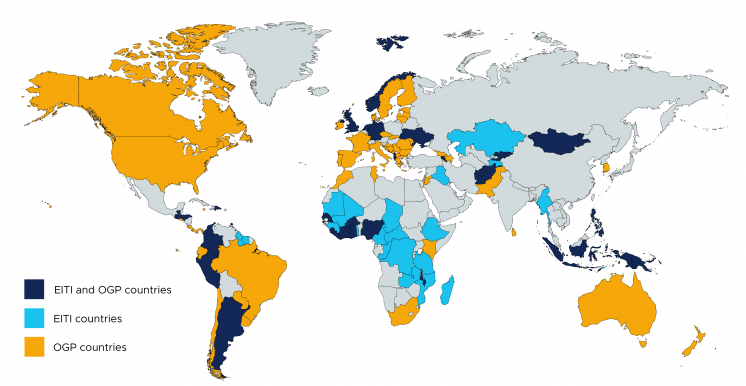
Furthering open government commitments in partnership with OGP
Furthering open government commitments in partnership with OGP
Building on our common objectives, the synergy between the EITI and the OGP continues to grow.
The EITI and the Open Government Partnership (OGP) are close cousins. Both initiatives aim to improve governance and build trust by opening up data and creating opportunities for citizen participation.
Thirty of the 52 EITI countries are OGP members, and OGP encourages resource-rich countries to join the EITI. OGP countries have made nearly 300 commitments related to natural resources in their National Action Plans since the partnership was established in 2011.

Both initiatives have committed to deepening their partnership and joint commitments. This collaboration is reinforced by the recent Open Government Partnership (OGP) Global Summit in Ottawa last week, as well as the upcoming EITI Global Conference that is taking place in Paris on 18-19 June. Building on our common objectives, the synergy between the EITI and the OGP continues to grow.
The recently published 2019 OGP Global Report charts collective results in improving openness. Many of the findings are directly relevant for the EITI. The report demonstrates that improved transparency leads to better economic results, including increased foreign direct investment inflows and better credit ratings. It also contributes to political stability. Freedom of association, independent media and government engagement with citizens lead to long-term improvements in health, education and economic growth.
Progress on beneficial ownership transparency, decline in civic space
Increasingly, governments are committing to disclose the beneficial owners of companies and other legal entities. In 2013, the United Kingdom was the only country to have made a commitment toward beneficial ownership transparency. Today, 22 governments have signed up. All EITI countries are required to disclose the beneficial owners of oil, gas and mining companies by January 2020.
The OGP Summit saw the launch of an exciting development with enormous potential: the UK-initiated Beneficial Ownership Leadership Group, a coalition of governments committed to advancing a global norm on beneficial ownership transparency. Government representatives from Armenia, Indonesia and Nigeria each highlighted the role of the EITI in their beneficial ownership pledges at the launch event.
Moving forward, the OGP Global Report recommends that governments pay attention to four areas when implementing beneficial ownership transparency: strengthening disclosure requirements, improving interoperability with other datasets, verifying information and engaging citizens in monitoring and accountability.
Slovakia in particular stood out on this topic, sharing inspiring lessons at the Summit. There, the burden of proof for verifying beneficial ownership information has been reversed; if anyone doubts the accuracy of reported information, the company in question must prove that it is correct. Civil society organisations have access to beneficial ownership data and have analysed these to identify networks of companies that have the same beneficial owner.
While progress is evident in most policy areas, civil liberties have decreased across the board. While civic space has shrunk less in OGP countries than in non-member countries, the trend is nevertheless concerning as it can undermine progress on beneficial ownership transparency and other areas. The OGP National Action Plan commitments that aim to address this issue remain few in number.
Opportunities for deeper synergies
Looking ahead, the OGP Summit highlighted some promising ideas for stronger synergies between the EITI and OGP:
- Stakeholders in countries that are members of both the OGP and the EITI can draw on the findings of EITI Validations when formulating OGP National Action Plans. All Validation documentation is made publicly available on the EITI website once the Validation is concluded.
- Resource-rich countries that are yet to join the EITI can use OGP National Action Plans to make commitments to gradually increase transparency in the extractive sector. That can include, for example, contract and revenue transparency and beneficial ownership disclosures.
- The OGP and the EITI can work together to identify and share best practice in implementing public beneficial ownership registries. There is potential for increased collaboration in other policy areas as well, including transparency around state-owned enterprises.
- Civil society organisations may wish to consider aligning advocacy targets for the EITI and OGP to fully leverage both processes.
Read more
Photo by Mike Gifford


